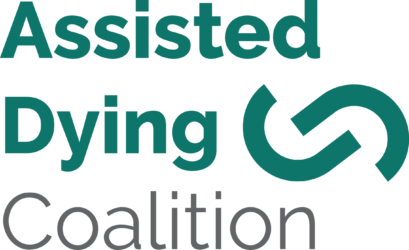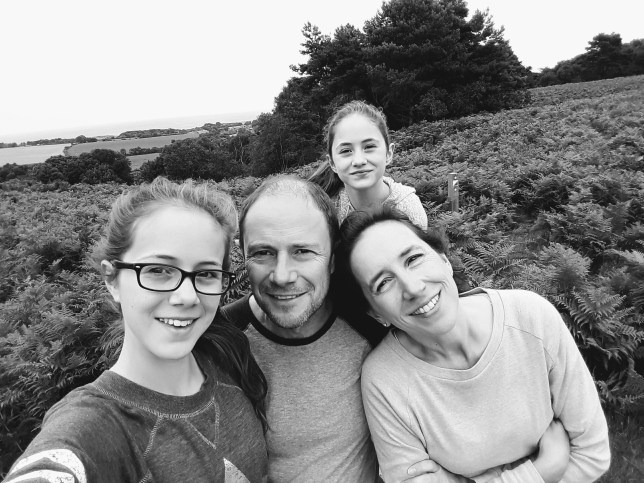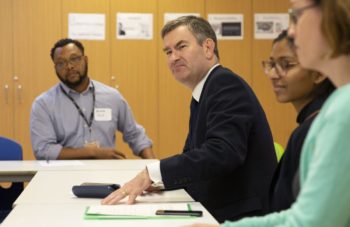The post Royal Paul Lamb to bring new legal case for the right to die appeared first on Humanists UK.
Paul Lamb, paralysed from the neck down, is bringing a new legal case against the Secretary of State for Justice, challenging the law on assisted dying in the UK. He is being supported by Humanists UK and represented by law firm, Leigh Day.
Paul, 63, was severely injured in a car accident in 1990 and has no function below his neck apart from limited movement in his right hand. He requires around the clock care and lives in constant pain.
Paul knows, as he gets older, he will inevitably want assistance to die. Paul wants to be able to end his life at the time and in the manner of his choosing. He argues that the current law – which prohibits any assistance under threat of up to fourteen years’ imprisonment – breaches his human right to a private life.
Alongside Jane Nicklinson, the widow of locked-in sufferer Tony Nicklinson, Paul Lamb previously challenged the UK’s 1961 Suicide Act in a case to the Supreme Court in 2014, and the European Court of Human Rights in 2015. With a notable dissent from the now President of the Supreme Court, Lady Hale, the Supreme Court held that Parliament must be afforded an opportunity to debate the issue before the courts decide whether to declare the current law incompatible with Paul’s human rights and those who find themselves in a similar position.
In 2015, the House of Commons debated but rejected a proposal from Rob Marris MP, which would have legalised assisted dying for those who are likely to die within six months, by 330 votes to 118.
In a letter sent to Justice Secretary David Gauke MP on 3 May 2019, Paul argues that the Suicide Act 1961 is incompatible with Article 14 of the European Convention on Human Rights, read with Article 8. Article 14 provides a qualified right not to be discriminated against on the ground of disability in respect of the enjoyment of other Convention rights. Article 8 encompasses the right to decide how and when to die, and in particular, the right to avoid a distressing and undignified end to life provided that the decision is made freely.
In the letter before action Mr Lamb asks the Secretary of State to ‘concede that sections 2(1), 2A(1) and 2B of the Suicide Act are incompatible with Articles 8 and 14… and undertake to take timely steps to remedy the incompatibility, either by employing the remedial power provided by section 10(2) of the Human Rights Act 1998 or by introducing and promoting an appropriate bill in Parliament.’
If a satisfactory response is not received from the government, Paul intends to apply to the court to seek a judicial review of the current legislation. Paul argues that the law should be changed to allow assisted dying to be legal for those in his position and the terminally ill.
Assisted dying is now legal in this form in five countries, most recently Canada, and is also legal for terminally ill people specifically in one country, nine US jurisdictions, and soon to be in the Australian state of Victoria.
Commenting on his decision Paul Lamb said:
‘I am paralysed from the neck down and live in a state of constant pain. In the future my suffering will inevitably become too much to bear. When that happens, I want to be able to control and choose the circumstances of my death. As the law stands, my only option would be to die through the inhumane process of dehydration and starvation. This situation cannot be allowed to continue.
‘Five years ago, I asked our courts to give me the right to control my own death and they told me to wait. Since then I have watched and waited as new evidence has emerged and progressive countries have given millions of others the choice I have asked for. And still the UK Parliament has done nothing. I have no option but to ask the Court to intervene again. I need them to help me, and many others in my position, to end this cruel and discriminatory law.’
Humanists UK Chief Executive Andrew Copson said:
‘It is a national disgrace that too many politicians have allowed themselves to turn a blind eye to the suffering of those like Paul for so long and instead rely upon our courts.
‘The right to die in a manner and timing of your own choice is a fundamental human right, which the UK has neglected for too long. It should not depend upon your ability to afford travel to Switzerland, nor force families into a heart-wrenching dilemma between letting their loved ones suffer, or supporting them and risking criminal investigation.
‘We are delighted by the news that Paul intends to bring this landmark case and challenge such a heartless law. Paul’s case seeks a more compassionate law, as it will give those who are terminally ill or incurably suffering the dignity they deserve. We will back him at every stage.’
Rosa Curling, solicitor at law firm Leigh Day who is representing Paul, said:
‘For many years, our client has patiently waited for Parliament to address the issue of whether section 2 of the Suicide Act should be relaxed or modified. But the pain and suffering he experiences, on a daily basis, means he cannot wait any longer. He believes the time is now right for the courts to intervene and declare section 2 incompatible with Articles 8 and 14 of European Convention on Human Rights because it unlawfully discriminates against seriously disabled people who wish to end their lives.’
NOTES:
For further comment or information, please contact Humanists UK press manager Casey-Ann Seaniger at casey@humanism.org.uk or phone 020 7324 3078 or 07393 344293. To request an interview with Paul, further comment from him, or video footage, contact Humanists UK at the above number.
The case will be between Paul Lamb and the Secretary of State for Justice. Paul has written to the Secretary of State under the pre-action protocol. Assuming the Secretary of State does not provide him with a satisfactory response (see above), papers may be issued asking the courts to decide whether the case should be given permission to proceed.
Paul Lamb is represented by Rosa Curling of Leigh Day, Philip Havers QC of 1 Crown Office, Adam Sandell of Matrix Chambers, and Eesvan Krishnan of Blackstone Chambers. Ms Curling, Mr Havers, and Mr Sandell previously acted for the claimant known as ‘Martin’ during the 2014 Supreme Court case.
Paul Lamb’s case is different from a case brought by humanist Noel Conway in 2018, supported by Dignity in Dying. Noel was only seeking a change in the law, which would have enabled those who were likely to die within six months, assistance to die. Unlike Mr Conway, Paul Lamb does not require a non-invasive ventilator, the presence of which we understand is one of the reasons why Noel was refused permission to have his case heard by the Supreme Court.
Read more about Paul Lamb: https://humanism.org.uk/about/our-people/patrons/paul-lamb/
New figures released by the Assisted Dying Coalition, of which Humanists UK is a member, found that more than one British person a week now travels to Switzerland to end their life.
Read more about Humanists UK’s campaign for assisted dying reform: https://humanism.org.uk/campaigns/public-ethical-issues/assisted-dying/
Humanists UK is the national charity working on behalf of non-religious people. Powered by over 85,000 members and supporters, we advance free thinking and promote humanism to create a tolerant society where rational thinking and kindness prevail. We provide ceremonies, pastoral care, education, and support services benefitting over a million people every year and our campaigns advance humanist thinking on ethical issues, human rights, and equal treatment for all.




 The post
The post